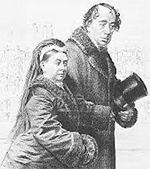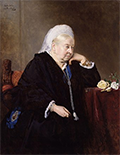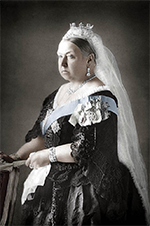Queen Victoria of the United Kingdom
Part 3: A Time to Remember
When Albert died in 1861, Victoria descended into a period of deep mourning from which many historians would argue she never really emerged. She wore black for the rest of her life; also for the rest of her life, she directed her servants to set out a set of clothes for him each morning. After Albert's death, Victoria was rarely seen in public, staying behind the protections of Balmoral Castle and Windsor Castle. She did have a few people in her inner circle that she depended on, however, one of whom was John Brown, a servant from Scotland who became one of her closest friends. Brown was devoted to Victoria and helped her deal with her overwhelming grief. She considered him a good friend as well and was saddened immensely when he died in 1883. The queen had another confidant after that, another servant, named Abdul Karim. Victoria considered Karim a very good cook, and he enjoyed teaching her Urdu. During her reign, Victoria served as the head of state for 10 Prime Ministers, some more famous than others. They were these:

Unlike Gladstone, whom Victoria did not at all like or appreciate, Disraeli enjoyed a cordial relationship with the queen. He was fond of writing her letters to update her on matters of state, and she was fond of writing him in return. Gladstone fervently wrote to the queen as well, but the two never really got along and she found his letters tedious. Disraeli it was who convinced the queen to style herself Empress of India. 
In 1887, people across the world celebrated Victoria's Golden Jubilee. A June 20 banquet in her honor had on the guest list 50 kings and princes. Ten years later, she enjoyed her Diamond Jubilee, an event that was attended by troops from all over the Dominion. After suffering a series of strokes, she died, on Jan. 22, 1901, at Osborne House on the Isle of Wight. She was 81 and had reigned for 63 years. During Victoria's long time on the throne, her realm expanded so much that it came to be said that "the Sun never set on the British Empire." The lands over which she reigned, nominally or otherwise, underwent great change. A prime example of this was the Industrial Revolution, which fundamentally altered the way that a great many people worked, lived, and thought about their way of living and place in the greater society. The more opportunities that people had, the more rights they wanted. One of the primary targets of advocacy throughout Victoria's reign was the right to vote. In a series of a Reform Acts in 1832, 1867, and 1884, Parliament granted this right to millions more men (but no women). Other momentous events that occurred in the Victorian Era:
Literature flourished as well, with well-known authors of the Victorian era writing novels, plays, poems, and tomes. Among the most well-known of these authors were Charlotte and Emily Brontë, Lewis Carroll, Charles Dickens, Arthur Conan Doyle, Robert Louis Stevenson, and Oscar Wilde. First page > Heir apparent > Page 1, 2, 3 |
|
Social Studies for Kids
copyright 2002–2026
David White



 Victoria suffered two deaths of those close to her in 1861. Her mother died in March. Mother and daughter had had a fractious relationship for much of Victoria's life, but the queen mourned her mother after her death. Near the end of that same year, Victoria's beloved Albert died.
Victoria suffered two deaths of those close to her in 1861. Her mother died in March. Mother and daughter had had a fractious relationship for much of Victoria's life, but the queen mourned her mother after her death. Near the end of that same year, Victoria's beloved Albert died.
